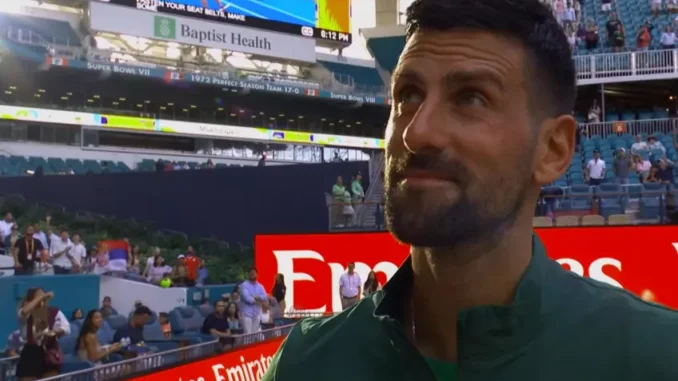
In the sun-drenched courts of Miami, a new chapter in tennis history was written as Novak Djokovic, the Serbian maestro, claimed a monumental victory that reverberated through the sport. On a vibrant Sunday afternoon, the 37-year-old etched his name above Rafael Nadal’s in the annals of Masters 1000 lore, securing his 411th win at this prestigious level. This triumph, a hard-fought 6-1, 7-6 (1) victory over Argentina’s Camilo Ugo Carabelli, didn’t just mark a win in the third round of the Miami Open—it crowned Djokovic as the undisputed king of Masters 1000 match wins, surpassing Nadal’s long-standing tally of 410.
Djokovic’s journey to this record is a saga of resilience and brilliance. Nearly two decades ago, he notched his first Masters 1000 victory in Paris, a modest beginning for a career that would redefine excellence. Since then, he’s woven a tapestry of dominance, threading together 40 titles at this elite tier—more than anyone in history. His path to 411 wins has been punctuated by golden eras: between 2011 and 2016, he racked up an astonishing 193 victories against just 23 losses, a stretch that saw him match and then outpace giants like Nadal and Roger Federer. “I’m honored to have another milestone, another record broken,” Djokovic said after the match, his voice carrying the weight of a man who’s spent years chasing greatness. “There’s always something on the line pretty much every time I play, and of course that motivates me to do well at tournaments.”
The match itself was a microcosm of Djokovic’s career—effortless at times, gritty when it mattered. He stormed through the first set in just 34 minutes, dismantling Ugo Carabelli with surgical precision. But the second set tested his mettle. Up a set and a break at 6-1, 2-1, he watched as the Argentine clawed back, leveling the score and forcing a tiebreak. “Things got complicated in the second set,” Djokovic admitted, recalling how Ugo Carabelli’s resurgence echoed his own first-round battle against Rinky Hijikata. Yet, in the tiebreak, he unleashed his champion’s instinct, reeling off six straight points to seal the win in 80 minutes. It was a performance that showcased both his technical mastery and his unyielding resolve.
This record-breaking moment comes at a pivotal time for Djokovic. After a 2024 season where he scaled back his Masters 1000 appearances to focus on Olympic glory—clinching gold in Paris—he’s returned to the hard courts with renewed vigor. His Miami campaign, his first since 2019, is a quest for a seventh title at the event, a feat that would further cement his legacy. Already a six-time champion here, he’s tied with Andre Agassi for the most men’s titles, and another victory would set him apart yet again. But the road ahead isn’t easy. Lorenzo Musetti, a tricky Italian with a 1-7 record against Djokovic, looms in the fourth round, promising a clash that could test the Serbian’s mettle on the Hard Rock Stadium courts.
Beyond the numbers—411 wins, 40 titles, 59 finals, 78 semifinals—lies a story of evolution. Djokovic has long held the edge in Masters 1000 titles and boasts the rare distinction of winning all nine events at least twice, a feat dubbed the Double Career Golden Masters. Now, with this latest milestone, he’s wrested the ultimate match-win record from Nadal, a rival whose clay-court dominance once seemed unassailable. Their rivalry, spanning 59 head-to-head clashes, has fueled some of tennis’s most epic battles, but in Miami, Djokovic stood alone. “I wasn’t thinking about it too much,” he confessed on court, downplaying the record’s immediacy but embracing its significance.
For fans, this victory is a celebration of a titan still hungry for more. At 37, with 99 ATP titles to his name, Djokovic is tantalizingly close to the century mark—a milestone he’d love to hit at a Major or Masters 1000 event. His 2025 season, already off to a strong start, hints at further conquests. The Miami Open, a tournament he last won in 2016, offers a chance to not just break records but to reaffirm his reign. As he navigates a draw still brimming with danger, Djokovic’s pursuit of greatness continues to captivate, proving that even after two decades, his hunger for history remains insatiable. In overtaking Nadal, he’s not just claimed a number—he’s redefined what it means to dominate a sport.
Leave a Reply